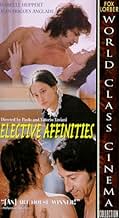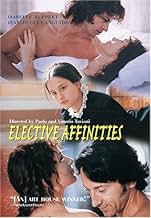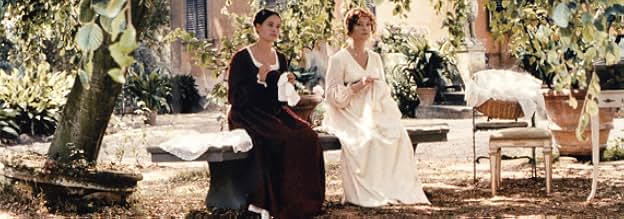Adicionar um enredo no seu idiomaThe novel (1809) by Johann Wolfgang von Goethe. The marriage of Edward and Charlotte gets worse with the arrival at the castle Young Ottilia, grandson of Carlotta, and Brass. Edward is attra... Ler tudoThe novel (1809) by Johann Wolfgang von Goethe. The marriage of Edward and Charlotte gets worse with the arrival at the castle Young Ottilia, grandson of Carlotta, and Brass. Edward is attracted to Ottilia, Carlotta by Otto. The action is moved from Germany to Tuscany San Miniato... Ler tudoThe novel (1809) by Johann Wolfgang von Goethe. The marriage of Edward and Charlotte gets worse with the arrival at the castle Young Ottilia, grandson of Carlotta, and Brass. Edward is attracted to Ottilia, Carlotta by Otto. The action is moved from Germany to Tuscany San Miniato and Poggio a Caiano and moved chronologically Napoleonic era (but the finishing touches a... Ler tudo
- Direção
- Roteiristas
- Artistas
- Prêmios
- 2 vitórias e 10 indicações no total
- Narrator
- (narração)
- Direção
- Roteiristas
- Elenco e equipe completos
- Produção, bilheteria e muito mais no IMDbPro
Avaliações em destaque
I don't care about state subsidies or whatever, as long as it results in some movie. Culture has to be subsidized anyway, the (mass) market mechanism, under capitalist relations, cannot supply it.
Let me quote a passage from Goethe's novel, Elective Affinities (1808) found in Bartlett's Familiar Quotations that goes a long ways toward explaining why Carlotta (Huppert) does not immediately divorce her cheating husband and take up with the dashing architect: "The sum which two married people owe to one another defies calculation. It is an infinite debt, which can only be discharged through all eternity." Carlotta represents Goethe's point of view.
I would also like to note that this is not Huppert at her best. She is too much long of face, and that sly cynicism of hers is a little too much on display. Additionally (I guess I can't help but review this a little!) the self-satisfied privilege of the upper classes depicted here allows one to understand the reasons for the revolutions that would again and again threaten the old order in Europe throughout the nineteenth century and into the twentieth.
(Note: Over 500 of my movie reviews are now available in my book "Cut to the Chaise Lounge or I Can't Believe I Swallowed the Remote!" Get it at Amazon!)
Title (Brazil): `As Afinidades Eletivas' (`The Elective Affinities')
In the 18th century Countess Carlotta (Isabelle Hupert) encounters her love of 20 years ago, one Baron Eduardo (Jean-Hugues Anglade). They reform their affinity and marry. One year later we find them happily at home in the Baron's Tuscan villa, a home the Baron adores for its geometric beauty (science) and Carlotta loves for its artistic aura (art). Eduardo wants to complete the buildings on their vast land holdings in Tuscany and convinces Carlotta to allow him to invite a famous architect Ottone (Fabrizio Bentivoglio), long a cherished childhood friend, to move in with them to complete the architectural possibilities the site offers. Carlotta has premonitions of bad omens and decides to invite her somewhat neurotic, asocial goddaughter Ottilia (Marie Gillain) to move in with the growing household and to be company to Ottone. After endless talking sprees there develops an affinity between Carlotta and Ottone and an equally strong one between Eduardo and Ottilia. Clandestine encounters become public when Carlotta discovers she is pregnant, the baby is born, looking very much like Ottone!, and a tragedy occurs when Ottilia is caring for the baby: the baby drowns. Ottilia return to her neurotic shell of isolation, the affairs are discovered and tragedies continue. There really is no ending to the story: it just stops.
For those of us who admire the consistently fine work by actress Isabelle Huppert this film is a draw. But sadly even the gifted Huppert (with her French spoken lines, along with the other two French actors, annoyingly dubbed into Italian) is unable to make us care for anything or anyone in this experiment of love. But perhaps that is more the fault of Goethe: 'Die Wahlverwandtschaften (also translated under the title Kindred by Choice) is the third novel by Johann Wolfgang von Goethe, published in 1809. The title is taken from a scientific term once used to describe the tendency of chemical species to combine with certain substances or species in preference to others. The novel is based on the metaphor of human passions being governed or regulated by the laws of chemical affinity, and examines whether or not the science and laws of chemistry undermine or uphold the institution of marriage, as well as other human social relations.' Like the metaphor on which this film is based this is a laboratory experiment rather than a dissection of love gone awry.
Grady Harp
Você sabia?
- ConexõesVersion of Die Wahlverwandtschaften (1974)
Principais escolhas
Detalhes
- Data de lançamento
- Países de origem
- Centrais de atendimento oficiais
- Idioma
- Também conhecido como
- Elective Affinities
- Empresas de produção
- Consulte mais créditos da empresa na IMDbPro


























